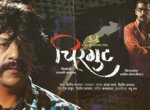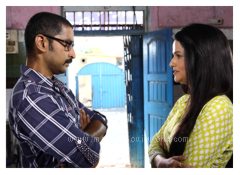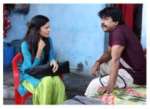‘Chirgut’ revolts against the corrupt system
 |
Rating: na
Banner: J. R. D. Entertainment Producer: Rajshree Jagtap Director: Pradeep Ghonsikar Story: Dilip Jagtap Screenplay- Dialogues: Sanjay Pawar, Dilip Jagtap Cinematographer: Madhu Rao Cast: Upendra Limaye, Chinmay Mandlekar, Siya Patil, Madhav Abhyankar, Sanjay Kulkarni, Pramod Shinde, Dr. Sharad Bhutadia and Ajit Bhagat Movie Review by: Ulhas Shirke |
Corruption is spreading like a cancer in the society and the main victims are the laborers and the neglected class, who live in the slums. Today, under the name of ‘Slum Rehabilitation Projects’ the builders with the help of local leaders, are exploiting the slum dwellers. The latest Marathi film ‘Chirgut’, (which means a worn out cloth piece) has been shot on the backdrop of a real existing slum off. Mumbai, where you find the concentration of people belonging to the most neglected community including Eunuch and prostitutes. The hero of this film Nagya (Upendra Limaye) an orphan, has been brought up by one such Eunuch (Ajit Bhagat).
The film has a hard hitting subject with Nagya educating the people from his slum colony, about their rights. He also dares to challenge the local MLA, when the latter approaches him with an offer. Watching Nagya’s stand against the corrupt system, Jahnavi ( Siya Patil) a student of Sociology from a Management Institute, is highly impressed. She talks to her close friend and project partner Vijya (Chinmay Mandlekar) about Nagya’s mission; but, he discourages her, saying that he had closely observed Nagya since his college days and that he would not be able to carry forward his fight. But, Jahnavi takes her own decision and leaves her college project to join Nagya’s movement. She is also joined by other two friends. Finally, when Vijya realizes that his professor is also working on the directions of the Government, he too joins their group.

Their movement spreads to other parts of Maharashtra, where people exploited by politicians and builders unite under their leadership. As a result of this, the chief Minister, a look alike of the present chief Minister of Maharashtra, orders inquiry against
some of his team members and bows down before the demand of the revolutionaries. The film has hard hitting dialogues by Sanjay Pawar and Dilip Jagtap, to create the conflict between Policy makers and slum dwellers.
The film did possess the content to expose the system, but it failed in the concluding part. The reason for which Nagya opens his fight, i.e. to hand over the rights to the people actually leaving in the slums, to develop their area; does not produce desired results in the end. It would have been better, if the director had concluded the film, showing the Slum rehabilitation rights given to Nagya and his associates. It would have sent a strong message to our policy makers and selfish politicians, who play hand n glove game with builders.
The film has clearly shown the MLA of ruling party and the opposition leader coming together, fearing about the sudden rise of such third front led by Nagya. In fact, the film has been targeted at such underprivileged people living in slums, reminding them about their rights. It also inspires them to form their own front, to seek their privileges. National award winning actor Upendra Limaye has given his best in the role of Nagya, which is almost a one man show. In the supporting cast Chinmay Mandlekar and Siya Patil find few scenes to make their presence felt. Other artistes like Madhav Abhyankar as the Professor, Dr. Sharad Bhutadia as opposition leader, Ajit Bhagat as Eunuch and Pramod Shinde as chief Minister have done well. Pradeep Ghonsikar’s direction is good in some of the important scenes but in the climax, he fails to create that desired impact, as the last scene has been dragged with the speech of Nagya. However, the sincere effort of the director to present this social issue in a cinematic format, is to be appreciated.



